304 fellow truck campers reveal their real-world experience with built-in 12-volt compressor refrigerators. Pay attention truck camper industry. Important information ahead!
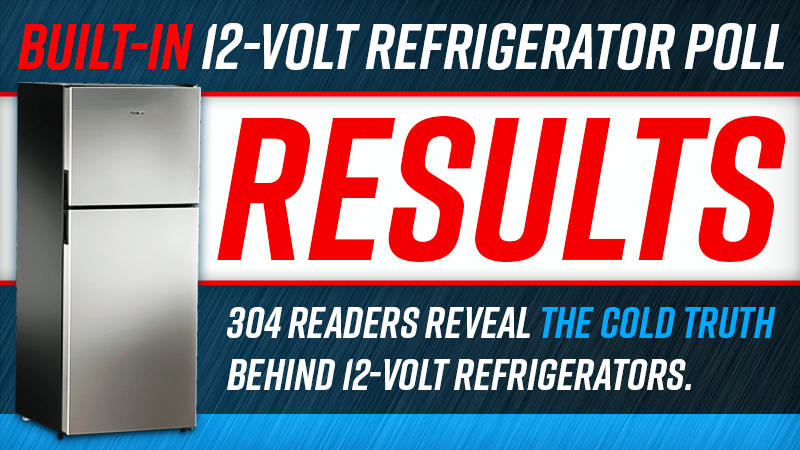
The majority of truck camper manufacturers are now installing 12-volt compressor refrigerators. Whether or not that fact is exciting or a concern likely depends on your comfort level with the 12-volt refrigerators. As someone who often prefers time-tested and proven over the latest and greatest, I understand that hesitation. Nobody wants to deal with appliance issues while you’re out truck camping. Been there. Done that. No thanks.
To get to the bottom of the real-world performance and reliability of built-in 12-volt refrigerators, we wrote eight straight-to-the-point questions and polled our readership. Seven days and 304 answers later, we can reveal the current reality of built-in 12-volt refrigerators in truck campers. Spoiler alert: it’s very good, but not perfection.
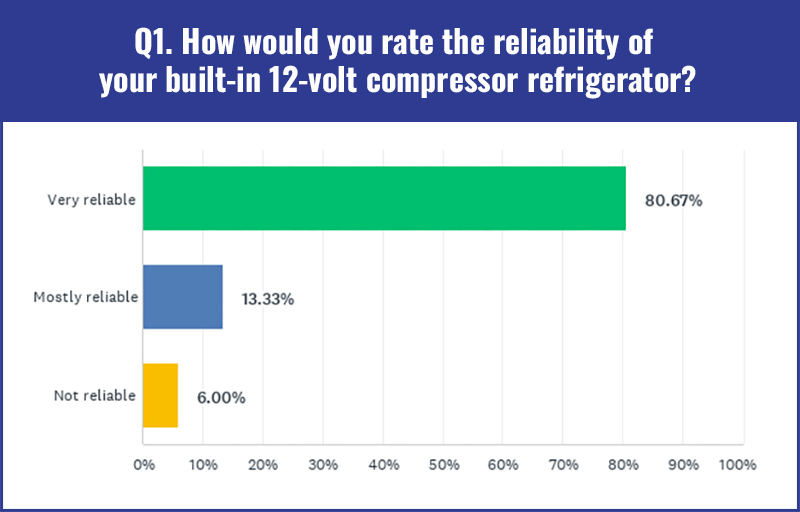
1. How would you rate the reliability of your built-in 12-volt compressor refrigerator?
Right out of the gate, we see that 94% of respondents report their 12-volt refrigerators as very reliable or mostly reliable. That is an incredibly positive result.
It would be interesting to poll our readers with the same question on gas absorption refrigerators. We’ve certainly had our fair share of challenges with gas absorption refrigerators over the years, and know plenty of others who have as well.
That stated, 6% reported a non-reliable performance with their built-in 12-volt compressor refrigerator, which is concerning. Twelve-volt compressor refrigerators are clearly a success, but there’s room to do better.
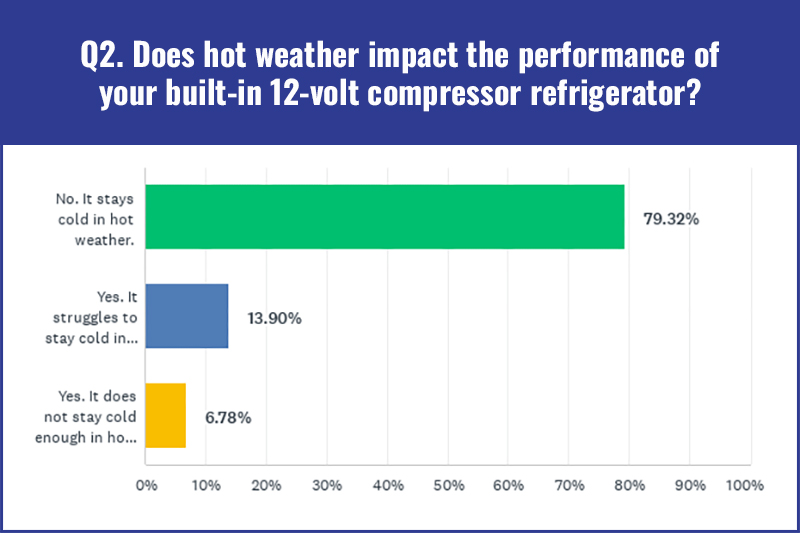
2. Does hot weather impact the performance of your built-in 12-volt compressor refrigerator?
Again we have an impressive result with 79% reporting that their built-in 12-volt refrigerator stays cold in hot weather. Another 13.9% report it struggles to stay cold. The insinuation with the “struggles” response is that the refrigerator isn’t staying as cold as they’d like.
This lines up with our experience with gas absorption refrigerators. For the great majority of the time, gas absorption refrigerators stay cold, but they can struggle in hot weather, especially if the side of the camper with the refrigerator is in the direct sun. Naturally, the same challenges exist for 12-volt compressor refrigerators.
Again, there’s a 6 to 7% response who report issues with their built-in 12-volt compressor refrigerators staying cold. One reason could be that most manufacturers have effectively sealed off the rear of the refrigerator units—eliminating the previously ubiquitous refrigerator vents. We’ve heard from at least one manufacturer who believes those vents are still necessary to release trapped heat.
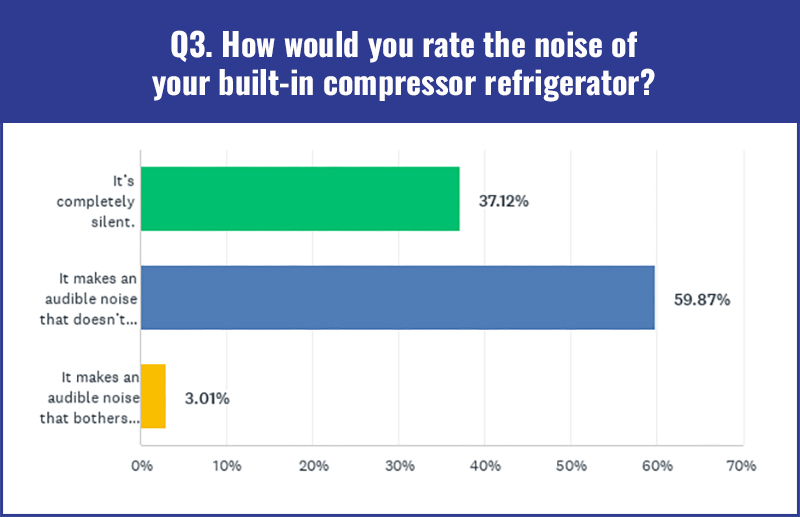
3. How would you rate the noise of your built-in compressor refrigerator?
One of the biggest complaints about gas absorption refrigerators—especially when mounted in a slide-out—is noise. In the worst cases, fans designed to ventilate the coils can make enough noise to keep folks awake at night. Many modifications have been submitted to fix this issue.
So what’s the verdict on 12-volt compressor refrigerator noise? Almost 97% report either silence or an audible noise that doesn’t bother them. That’s astounding.
The 3% reporting a noise that bothers them could be a specific installation issue, a specific product (or product example) issue, or folks who—like me—are more sensitive to noise than most.
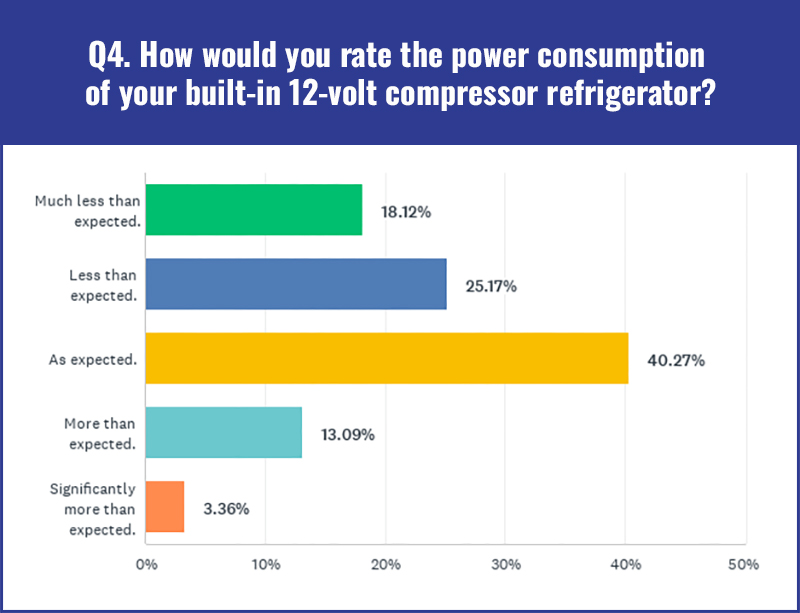
4. How would you rate the power consumption of your built-in 12-volt compressor refrigerator?
The number one concern we’ve had about making 12-volt compressor refrigerators standard is making sure the connected battery bank and solar set-up are enough to power the units.
To cut to the chase, we asked readers to rate the power consumption of their built-in 12-volt compressor refrigerators. The result is promising. Over 83% rated the power consumption as expected, less than expected, or much less than expected. Again, another fantastic result.
16.5% rated the power consumption as more than expected or significantly more than expected. That’s less than I expected given that we’re still in the relatively early days of balancing these units with battery and solar banks. The good news is you can usually add battery and solar capacity to compensate.
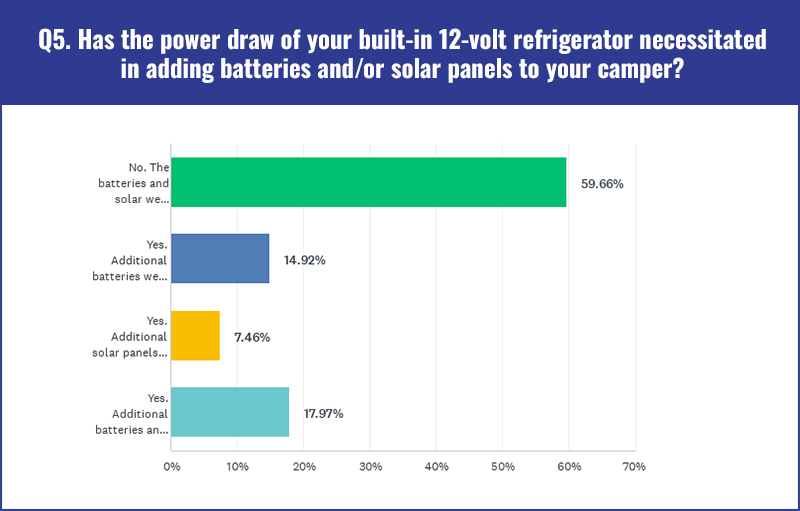
5. Has the power draw from your built-in 12-volt refrigerator necessitated adding batteries and/or solar panels to your camper?
Speaking of adding battery or solar capacity to compensate, over 40% of readers reported adding batteries, adding solar panels, or adding both batteries and solar panels to help power their 12-volt compressor refrigerator.
Of course, that means almost 60% reported not needing to add solar or batteries for their built-in compressor refrigerator. That’s good, but clearly more needs to be done to better balance the power requirements of 12-volt compressor refrigerators against battery banks and solar set-ups.
So just how much battery and solar are needed?
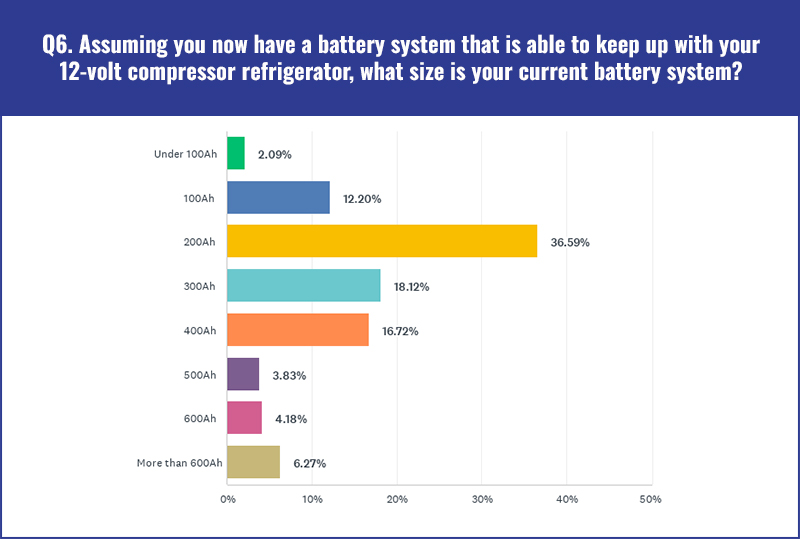
6. Assuming you now have a battery system that is able to keep up with your 12-volt compressor refrigerator, what size is your current battery system?
The responses to the ‘how much battery is needed’ question run the gamut, but there’s a clear spike at 200Ah with strong data at 300Ah and 400Ah. This lines up with what we’ve heard from fellow truck campers who have a built 12-volt compressor refrigerator. Unless you have a smaller and more efficient model, you need at least 200Ah in your battery bank; 300Ah to 400Ah is preferred.
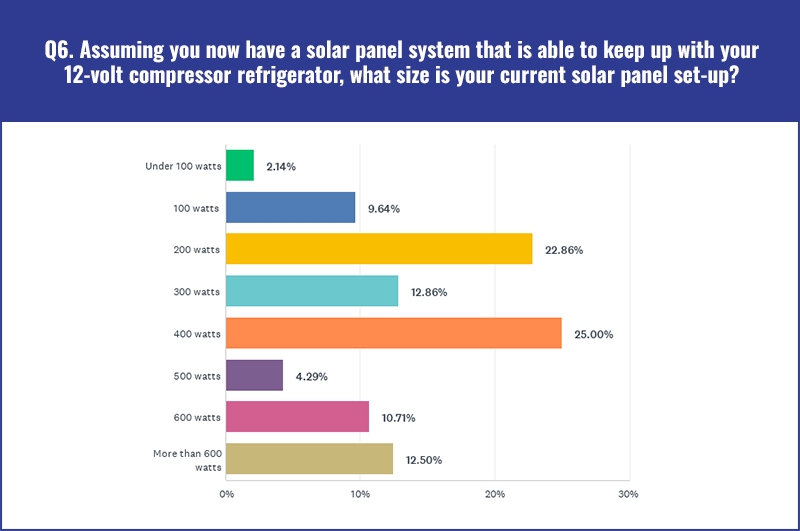
7. Assuming you now have a solar panel system that is able to keep up with your 12-volt compressor refrigerator, what size is your current solar panel set-up?
To keep those batteries charged via solar while powering the 12-volt refrigerator, the poll provides some additional clarity. Where 200Ah was the spike for battery banks, 200 watts was the first spike for solar panels, with another at 400 watts. This also lines up with what we have heard from manufacturers, dealers, and readers. Ideally, you’d have at least 200Ah of battery, and at least 200 watts of solar. Twice that is even better.
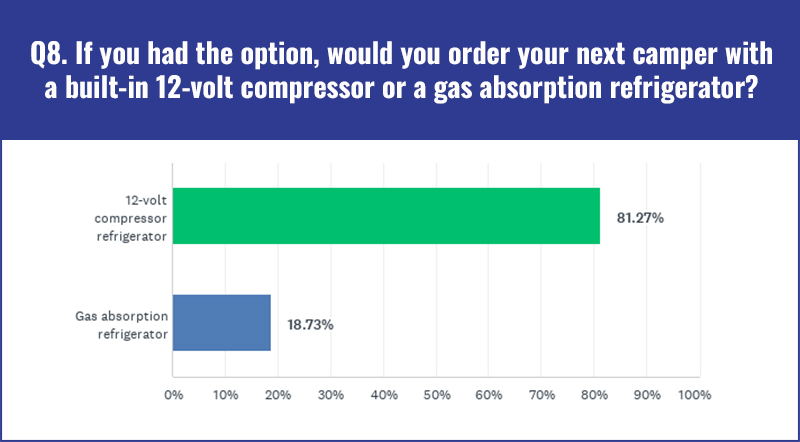
8. If you had the option, would you order your next camper with a built-in 12-volt compressor or a gas absorption refrigerator?
The final tell for this survey was to ask if camper owners with 12-volt compressor refrigerators would order a new camper with another 12-volt compressor refrigerator, or go back to gas absorption. This isn’t even possible for the great majority of truck camper makes and models, but the question serves to tell us exactly where we are as a community on 12-volt compressor refrigerators.
According to the poll, over 81% would stay with a 12-volt compressor refrigerator. That lines up with the 80% who reported 12-volt refrigerators as ‘very reliable’, the 79% that reported 12-volt compressor refrigerators staying ‘cold in hot weather’, nearly 97% who reported the units being ‘completely silent’ or making noise that ‘didn’t bother’ them, and over 83% who said the power consumption was ‘as expected’ or better.
So what about the 18.7% who would go back to a gas absorption refrigerator? They likely ran into one of the potential pit falls—not enough battery bank, not enough solar capacity, an installation that wasn’t set-up properly, or a unit that was defective. Put another way, had they started with more than enough battery and solar capacity, my guess is that they’d have polled differently. On the other hand, if there are installation issues or unit-to-unit quality issues, that could also be an issue. Bought a camper at the peak of the pandemic demand and shortages? The issue could be there.
The Cold Truth
Our poll of 304 truck camper owners reveals strong support for built-in 12-volt compressor refrigerators. Over 94% rated them as “very reliable” or “mostly reliable,” likely outperforming traditional gas absorption models. That’s a drop-the-mic result if we’ve ever seen one.
Overall, the poll indicates that 12-volt refrigerators are a significant improvement in reliability, noise, and power efficiency, but proper setup and adequate power capacity are crucial for success. Anyone out there looking for an excuse to get a bigger battery bank or solar panel array? Here’s your huckleberry.
